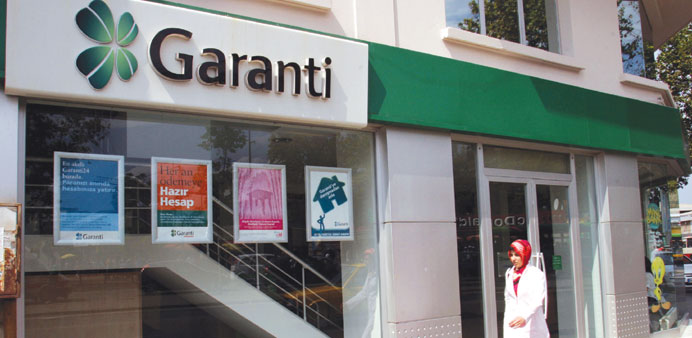A woman passes a Garanti Bankasi branch in Istanbul (file). Officials at several Turkish banks including Garanti, Isbank and Ziraat Bank confirmed the cyberattacks, saying they had caused intermittent disruption.
Reuters
Istanbul
Turkish banks reported sporadic disruption to credit card transactions yesterday as hackers stepped up a two-week barrage of cyberattacks, believed to be the worst the country has seen.
Local media have suggested that the bombardment of public and financial websites could be coming from Russia, after a sharp worsening of tensions between Moscow and Ankara, or staged by hacking group Anonymous. But no clear evidence has emerged, and authorities have avoided pointing the finger.
Officials at several Turkish banks including Isbank, Garanti and state lender Ziraat Bank confirmed the attacks, saying they had caused intermittent disruption. Bank shares were unmoved by the news.
“The attacks are serious,” said Onur Oz, a spokesman for Internet provider Turk Telekom. “But the target is not Turk Telekom. Instead, banks and public institutions are under heavy attack,” he said.
“A majority of Turkish institutions use Turk Telekom as the service provider, therefore we are the ones doing the defence against these attacks.”
A government cyber security unit was taking precautions and the incident was under control, Transport Minister Binali Yildirim said earlier this week. He did not comment specifically on the targeting of banks, and his ministry was not available for comment yesterday.
“These attacks began two weeks ago but have intensified over the past two days,” said Burak Atakani, a network specialist from Istanbul Technical University. He said that the service provider used by some universities, police academies and the research department of the military had also come under attack.
Nic.tr, a non-government body that administers addresses for websites using Turkey’s “.tr” domain, including ministries, the military, banks and many commercial sites, said earlier this week that the attacks originated from “organised sources” outside Turkey.
Turkey incensed Russia last month by shooting down a Russian military plane near the Syrian border, and Moscow has retaliated with economic sanctions. In the past, countries such as Estonia and Georgia have suffered cyberattacks emanating from Russia after incurring Moscow’s anger.
Reuters sought comment from the Russian foreign ministry, but none was immediately available.
Meanwhile, volatility in markets and stricter regulations are likely to put pressure on profits and capital adequacy ratios across Turkey’s banking sector next year, the head of top-listed lender Isbank said yesterday.
Adnan Bali told Reuters in an interview that an expected 10% return on equity and 2% return on assets posed a challenge to the health of the sector.
“Unfortunately there is a perception that banks profit too much. Any given (Turkish) sector has 15-20% profitability, whereas it’s 10% in the banking sector. A return on equity reduced to 10% and a return on assets less than 2% will not carry the banking sector,” Bali said.
Turkey’s implementation of the Basel III set of global banking regulations, due to come in March, is expected to crimp profit and force banks to hold more regulatory capital.
Turkish bankers have been hoping for some easing in the measures, but Deputy Prime Minister Mehmet Simsek, who is charge of the economy, told Reuters in an interview this week that the implementation would go ahead as planned.
Bali said that Turkish banks will average 10-12% growth in loans and deposits in 2016, with capital adequacy ratios likely to be at 14-15%.
“Within the frame of Basel III regulations that will be implemented from March, and taking into account the deposit costs as well as limits on fee and commission revenues, it will be difficult to improve profitability,” Bali said.

